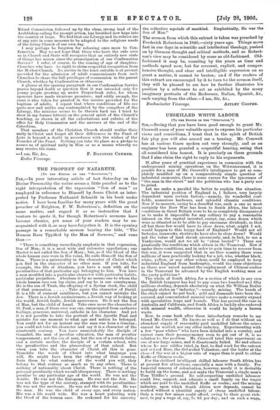THE PROPHET OF NAZARETH.
LTO TUE EDITOR Or THE " SYRCTATOR."]
SIR,—In your interesting article of last Saturday on the Divine Personality the writer seems a little puzzled as to the right interpretation of the expression "Son of man" as employed in reference to Himself by Jesus Christ as inter- preted by Professor Nathaniel Schmidt in his book under notice. I have been familiar for many years with the great preacher of Brighton, F. W. Robertson's, definition on the same matter, and regard it as so instructive that I venture to quote it, for though Robertson's sermons have become classics, yet some of your readers may be un- acquainted with it, or may have forgotten it. It is the opening passage in a remarkable sermon bearing the title, "The Human Race Typified by the Man of Sorrows," and runs
thus :—
" There is something exceedingly emphatic in that expression, Son of Man; it is a most wide and extensive appellation ; our Master is not called tho Son of Mary ; but, as if the blood of the whole human race were in His veins, He calls Himself the Son of Man. There is a universality in the character of Christ which you find in the character of no other man. If you take, for example, the life of Abraham, you have a man with all the peculiarities of that particular ago belonging to him. You have a man moulded into a particular character with particular habits, particular prejudices. Abraham is by no means one to whom the whole human race can lay claim, and say he is our countryman. He is the son of Tirah, the offspring of a Syrian stock, the child of that generation Take again the character of David. It is a life of eminent saintliness, but you cannot mistake the Jew. There is a Jewish exclusiveness, a Jewish way of looking at the world, Jewish faults, Jewish narrowness. He is not the Son of Man, but the child of Israel. Take once more the character of St. Paul, a man, if there ever was one, emancipated from exclusive feelings, generous, universal, catholic in his character. And yet it is not possible to take the portrait of the Apostle Paul and mistake for one moment to what age and nation he belonged. You could not for an instant say the man was born a Grecian ; you could not take his character and say it is a character of the nineteenth century. You have unmistakably the disciple of Gamaliel, the man of peculiar education, the man of peculiar temperament ; not the son of man, but the son of a certain fathrr and a certain mother, the disciple of a certain school, with the peculiarities and the phraseology of that school. But when you take the character of Christ all this is gone. Translate the words of Christ into what language you will, He might have been the offspring of that country. Date them by what century of the world you will, they belong to that century as much as to any other. There is nothing of nationality about Christ. There is nothing of the personal peculiarity which we call idiosyncrasy. There is nothing peculiar to any particular age of the world. He was not the Asiatic. He was not the European. He was not the Jew. He was not the type of the century, stamped with its peculiarities.. He was not the mechanic. He was not the aristocrat. He was the man. He was the child of every age, and every nation. His was a life world wide. His was a heart pulsating with the blood of the human race. He reckoned for his aucestry the collective myriads of mankind. Emphatically, He was the Son of Man."
The sermon from which this extract is taken was preached by Frederick Robertson in 1846,—sixty years ago. Things move fast in our days in scientific and intellectual theology, pushed on by German thought and critical methods, and so Robert- son's view may be considered by some as old-fashioned. Old- fashioned it may be, counting by the years as time and methods speed now, but for reverent, explicit, and compre- hensive thought, and clear and intelligible expression on so great a matter, it cannot be beaten; an d if the readers of this extract are encouraged by it to turn to the sermon itself, they will be pleased to see how he further illustrates his position by a reference to art as exhibited by the many imaginary portraits of the Redeemer, Italian, Spanish, &c., each varying from the other.—I am, Sir, &c.,






































 Previous page
Previous page